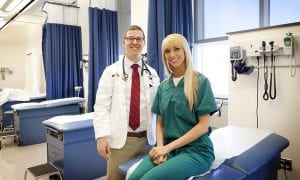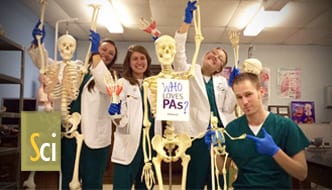
Finding a career which allows you to help people is a noble pursuit. Selecting the right degree can be tough, especially with greater access to education unlike ever before. College students have more choices and infinite possibilities when it comes to degrees that help people.
Whether it’s a career in the arts, business, science, or something completely different, getting a degree is just the beginning of your journey.
You may seek a path of purpose and meaning rather than a following a specific area of interest. You, too, have a multitude of options from which to choose.
If you want a career where you feel like you’re making a positive impact on others’ lives, check out this list of six degrees that help people to consider.
1. Biology

In general, studying biology can be a fantastic jumping-off point with an endless supply of career opportunities.
Biology continues to be a common degree choice for those with interests in the medical field. While this is very much true, biology students don’t necessarily need to become doctors to do good for their fellow man.
Check out some of the obvious and not-so-obvious career paths for biology degree recipients:
- Becoming a Doctor—We will always need the best and brightest doctors to keep the world safe and healthy. Before medical school, most students opt to study biology as this major can go a long way in helping students complete many prerequisite classes and prepare for the MCAT. Consider that biology is the basis for physiology and other medical principles. Meaning that if you do want to become a doctor, biology is a solid choice. Keep in mind that the road to your doctorate can be long, challenging, and very expensive. However, don’t let that deter you since helping people is at the core of what it means to be a doctor.
- Medical Scientist—Throughout human history, humanity has been plagued with many forms of disease. For example, smallpox at one point was relatively common and had been around since the days of Egyptian Pharaohs. Thanks to medical research, scientists successfully created a smallpox vaccine, eventually leading to the worldwide eradication of this devastating disease. This is just one example of how becoming a medical researcher can be invaluable to helping people. Similar to becoming a doctor, most Medical Scientists have a Ph.D. in biology, while others choose to pursue a medical degree instead of, or addition to, a Ph.D. It’s not unreasonable to hold out hope for a cure for cancer in our lifetime. If that does happen, rest assured that this triumph was possible because of the hard work of Medical Scientists.
It’s worth mentioning that a degree in biology is merely the beginning of a much longer journey for the careers listed. In fact, other degrees also prepare you for life in the medical field.
2. Nursing

If you want to help those in need of medical assistance, becoming a doctor is only one way to achieve this goal. Becoming a registered nurse is more achievable in less time than pursuing a doctorate. It’s a job that’s in high demand, and these trained professionals are much needed in the healthcare system.
Registered nurses provide patient care, while also educating patients and the public about various health concerns. It’s also not unusual for nurses to offer counseling and emotional support to patients and their family members.
For those with interest in becoming a registered nurse, there are a handful of schooling options:
- Diploma in Nursing—Considered one of the most traditional training programs for nurses; students typically take one to three years to complete. This degree prepares students on the fundamentals of clinical care to attain licensure. In recent years, more employers prefer hiring candidates with an Associate’s or Bachelor’s degree.
- Associate Degree in Nursing—A common choice for registered nurses; these programs often take two to three years for completion and typically offered by higher education institutions. This degree often prepares students for professional life as well as exposing them to new specialties.
- Bachelor of Science in Nursing—Providing a strong foundation for job growth potential, more students are choosing to pursue this degree. Completion can happen between three to four years; this degree is specifically designed for specialized fields of nursing.
Hospitals rely on their hard-working nurses. But there’s still one more medical career path you may not have considered.
3. Physician’s Assistant

Due to a shortage of primary care physicians, particularly in rural areas, the concept of the physician’s assistant was conceived at the Duke University Medical Center in 1965. Today, there are more than 187 accredited programs across the United States with approximately 86,700 practicing physician assistants.
A physician’s assistant is a state licensed healthcare professional who practices medicine and works closely with physicians. Physician’s assistants can perform an extensive range of medical services from entry-level primary care to highly technical specialty procedures in nearly every medical and surgical healthcare setting. In some rural and underserved communities, physician’s assistants may serve as the primary providers of healthcare.
It’s in these communities that physician’s assistants genuinely prove their worth. And although similar to becoming a doctor, this is yet another degree a student can pursue with interests in healthcare.
4. Psychology

The world at large is fast realizing the importance of mental health. Unfortunately, this is another field with a significant worker shortage.
In terms of helping others, psychology can be tremendously rewarding. While there is value in pursuing a doctorate, many careers only need a master’s degree in clinical psychology.
Here’s a look at several career paths available to students of psychology.
- School/Career Counselor—Counselors have come to play a crucial role in the lives of public and private school students. It is their job is to help students succeed, empowering them to make positive decisions that support academic and personal development. Counselors often work closely with students, teachers, and school administrators. Becoming a school or career counselor involves getting either a bachelor’s or master’s in psychology. The type of degree needed will depend on state licensure rules or an institution’s hiring requirements.
- Marriage/Family Therapist—Marriage and family therapists are licensed mental health professionals who work with families to help them improve their relationships with one another. This type of psychotherapy involves working with families to analyze and resolve their problems. While some states do offer licensure to those with a bachelor’s degree, most will require a master’s degree.
- Substance Abuse Counselor—This type of mental health counselor specializes in treating patients who have a chemical dependency on drugs or alcohol. Addiction can be devastating to those who suffer from it and to those they love. For residents of West Virginia, you may already know that the Mountain State has been ground zero for the opioid crisis in America. Addiction to opioids tears families apart and has had a negative impact across the state. What’s worse is that even though the effects of drug addiction are apparent, West Virginia has a severe shortage of licensed psychologists and substance abuse counselors who can help these communities heal. While challenging, working as a substance abuse counselor can be very fulfilling.
In the end, psychologists perform an incredibly valuable, underappreciated service to their communities.
5. Social Work

Similar to psychology professionals, those involved in social work provide an immensely important service to the people in their community. The two fields often intertwine but have considerable differences.
Psychology has a primary focus on the mental well-being of patients, whereas social work aims to enhance overall well-being and help meet the basic human needs of all people. Mainly, social work concentrates on the needs and empowerment of individuals who are dealing with oppression, vulnerability, or poverty. The idea is that everyone in a civilized society is entitled to individual basic needs.
Most states require that candidates have a bachelor’s degree in social work (BSW) for licensure, and many opt to pursue a master’s degree as well.
6. MBA

Many businesses in the private and public sector focus on helping others as part of their mission. In fact, many nonprofit organizations rely on smart and skilled business leaders to achieve their mission efficiently and effectively.
From cancer research to providing a support system for military veterans, you may find yourself working for an organization committed to a cause that matters to you. While no workplace is perfect, you will feel a greater sense of camaraderie with co-workers when they share your affinity for the organization’s mission.
It may seem counterintuitive to seek a business-oriented degree to help people, but few degrees can match the level of applicable knowledge students can gain. Candidates with an MBA can create processes and refine strategies to make nonprofits and private businesses alike more efficient and successful. With a skilled management team, an organization can have limitless potential in achieving its goals and furthering its mission.
Choosing Between Degrees That Help People
There is an infinite number of ways to select a job that will allow you to be helpful to others. The best part is that you can choose how you want to help people.
From medicine to mental health, you should now have a better idea of which degrees will better equip you for life in a career helping others.
Ready to get started?
All of the degrees that help people found in this article can be found right here at West Liberty University. To learn more about some of these programs, be sure to check out the following resources.